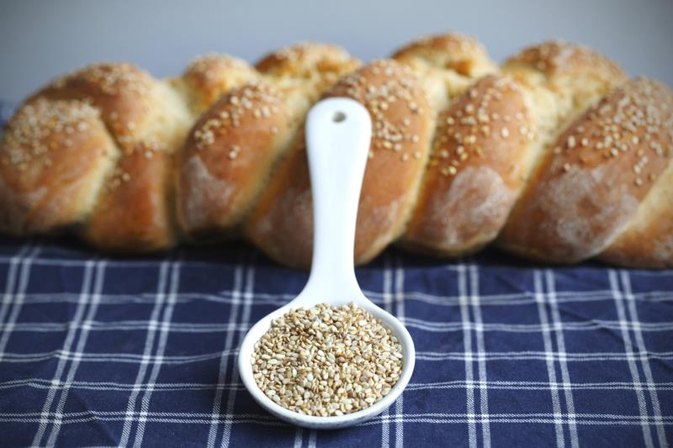Menu
Your cart is empty
Looks like you haven't added anything to your cart yet
What Is the Nutritional Difference Between Hulled & Unhulled Sesame Seeds?

It’s no surprise that most of America’s sesame seed crop is used by the baking industry -- the flavorful seeds are a familiar topping on bread, rolls, breadsticks, crackers and biscuits. Even though they’re often treated as a garnish, sesame seeds are an excellent source of heart-healthy unsaturated fat, dietary fiber and several important vitamins and minerals. When it comes to certain nutrients, whole sesame seeds, or those that retain their light brown skins, are slightly more nutritious than the hulled variety.
Basic Value
Sesame seeds are incredibly tiny -- it takes about 1,000 of them to make a 1-ounce serving. In terms of calories and basic nutrients, whole sesame seeds are nutritionally comparable to hulled sesame seed kernels: You’ll get right around 160 calories, 13.6 grams of mostly unsaturated fat, 4.8 grams of protein and 7.3 grams of carbohydrates from a 1-ounce serving of either, according to the U.S. Department of Agriculture.
Dietary Fiber
Whether their hulls have been removed or remain intact, sesame seeds are a good source of dietary fiber. Whole sesame seeds are a somewhat better source of insoluble fiber because their hulls contain bran, but hulled sesame seeds still deliver about the same amount of total dietary fiber. Whole dried sesame seeds and bare dried kernels each provide just over 3 grams of dietary fiber per 1-ounce serving.
Minerals
If you’re looking to increase your intake of calcium or iron, whole sesame seeds are a much better option than hulled. You’ll get close to 280 milligrams of calcium and 4 milligrams of iron from a 1-ounce serving of whole dried sesame seeds, whereas a serving of hulled dried sesame seeds supplies less than 20 milligrams of calcium and just 1.8 milligrams of iron. Both varieties are good sources of zinc, phosphorus and magnesium.
Vitamins
Sesame seeds are a significant source of B vitamins, particularly thiamine, vitamin B-6, niacin and folate. Although whole sesame seeds are slightly higher in thiamine and vitamin B-6 than hulled seeds are, bare sesame kernels are slightly higher in niacin and folate. You’ll also get more vitamin E from hulled seeds than you will from whole seeds -- a 1-ounce serving of hulled sesame seeds contains almost 7 times as much vitamin E as a serving of whole seeds.
Phytonutrients
With or without the hull, sesame seeds are an excellent source of antioxidants and polyphenols, including lignans. Diets rich in plant lignans are associated with a reduced risk of heart disease and may help protect against certain hormone-related cancers, according to the Linus Pauling Institute. A comprehensive review published in “Critical Reviews in Food Science and Nutrition” in 2007 notes that sesame lignans also promote healthy cholesterol levels and help prevent high blood pressure.
Organic Sesame Seeds is available to purchase at SFMart.com
- Choosing a selection results in a full page refresh.
